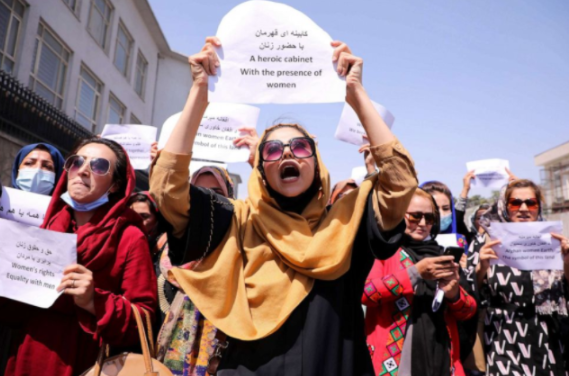The Uncertain Fate of Afghanistan

Afghan women fight for their right to work and receive education in this new political scenario.
November 8, 2021
The future of women and children in Afghanistan is in jeopardy as the threat of the Taliban weighs against them.
Citizens of Afghanistan and people all around the world held their breath when the Taliban took control of the country in August 2021. The USA joined the conflict over 20 years ago to protect Afghanistan from foreign interest, but this long war ended on August 15th, when the capital city of Kabul fell to the Taliban. By the culmination of the war, 7,000 United States troops had lost their lives, according to the Watson Institute at Brown University.
The casualty rate of Afghani soldiers was much higher. Moreover, innocent civilians in Afghanistan faced consequences due to this war. In its assessment, the United Nations documented 1,659 civilians killed and 3,254 injured.
Approaching almost two months since the Taliban takeover, many are wondering what changes have been made to the country. The most immediate concern for the country was terrorism. The Taliban’s political victory offers a significant counterterrorism problem, since international terror organizations like ISIS and al-Qaeda may see an opportunity to expand their operations in a Taliban-led Afghanistan, according to the US Department of State.
While the Taliban promised to cut ties with al-Qaeda in terms of their pact with the United States in February 2020, there is no sign that they would live up to their promises, and al-Qaeda has welcomed the Taliban’s triumph, according to the New York Times in September 2021.
However, the biggest change comes to women and children living in Afghanistan. While the Taliban have continuously affirmed that girls will continue to attend school and women can still work, the realities are not as promising. Zakia Menhas, a medical student at Kabul University, recently spoke with NPR about these issues.
Despite the Taliban’s promise to allow all female students to resume their studies, she said she has been denied the opportunity to do so. Menhas said, “We know that there are laws about the human rights and all the women rights. So we want them to just make Taliban have those rules as their main rules and just show them that we girls and women have the right to go out and work and study.”
We know that there are rules allowing all women to receive an education and work, but how likely are the Taliban to follow this rules? According to ABC News, the Taliban have repeatedly told the public that they will allow women to have all rights from before the takeover. However, 12,000 to 14,000 women in Afghanistan have not been given their pay for over three months. 16,000 women have been barred from teaching at public high schools, even thought they have the necessary degrees.
The chancellor of Kabul University sent out a statement saying that women would not be allowed to attend the college due to putting “Islam first”. He later redacted that statement due to criticism by major world news reporters. However, women will not be returning until universities “create a safe Islam environment”. With the new government, no one is certain that women and girls in Afghanistan will be safe.
The Taliban has made many promises for the future of Afghanistan. As of now, despite the appearances and promises the Taliban have put up as cover to the rest of the world, the country is filled with inequality. Threats still exist for women and children in Afghanistan, and global superpowers are unable to help, as they’ve signed peace agreements to stay out of global affairs with the Taliban. When these individuals, their communities, and their nation is most in need, security and higher education can be a matter of life and death.











